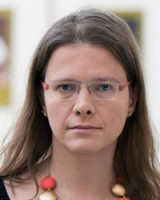
prof. dr hab. Katarzyna Górak-Sosnowska
head of MECAU, professor
- Bio
Professor of Sociology; she earned her PhD in economics at the SGH Warsaw School of Economics and her habilitation in the study of religions at Jagiellonian University in Cracow. She works as an associate professor at the Middle East and Central Asia Unit. In 2012-2020 avice-Dean of Master’s Studies. Her research interests focus on the contemporary Middle East and Muslim minorities in Europe. She published several monographs including Deconstructing Islamophobia in Poland (2014), Managing Spoiled Identity. The Case of Polish Female Converts to Islam (co-author, 2023) and edited Muslims in Poland and Eastern Europe (2011) and Non-Inclusive Education in Central and Eastern Europe (co-editor, 2022). Head of research projects funded by the European Commission (CERV, Horizon 2020), Erasmus+ Programme, UNESCO, as well as Polish MFA, MHE and NCN (currently two projects: EMPATHY and DIGITISLAM). President of the Association Forum Dziekanatów (Student Services Employee Association).
- Publications (in English)
Monographs / textbooks / edited volumes
- K. Górak-Sosnowska, M. Kubarek, In the World of Islam. Didactic materials for secondary school teachers, Polski Komitet ds. UNESCO, Warszawa 2009
- Muslims in Poland and Eastern Europe. Widening the European Discourse on Islam, K. Górak-Sosnowska (ed.), University of Warsaw, Warsaw 2011, ss. 343.
- K. Górak-Sosnowska, Deconstructing Islamophobia in Poland. Story of an Internet group, Uniwersytet Warszawski, Warszawa 2014, ss. 128
- Muslim minorities and the refugee crisis in Europe, K. Górak-Sosnowska, J. Misiuna, M. Pachocka (red.), SGH, Warszawa 2019, 339 s.
- Non-Inclusive Education in Central and Eastern Europe, K. Górak-Sosnowska, U. Markowska-Manista red., London: Bloomsbury 2023.
- B. Abdallah-Krzepkowska, K. Górak-Sosnowska J. Krotofil, A. Piela Managing Spoiled Identity. The Case of Polish Females Converts to Islam, Brill: Leiden 2023.
Chapters
- K. Górak-Sosnowska,Islam in Europe: Danger or Chance for a Peaceful co-Existence? [w:] Europe in Global World – blending differences, Lodz 2003, ss. 110–115.
- K. Górak-Sosnowska,Perception and Misperception of Islam in Polish Textbooks, “Rocznik Orientalistyczny”, t. LX, zeszyt 1, 2007, s. 75-84
- K. Górak-Sosnowska,Informal Mechanism of Social Protection: the Case of the Arab World, [w:] NGOs, International Aid and Development in the South, A. Bankole, E. Puchnarewicz (red.), UW, Warszawa 2008, s. 113-125.
- K. Górak-Sosnowska,Teaching about the World of Islam and its Implications on Attitudes of Secondary School Students towards Muslims and Others [w:] Celebrating the European Year of Intercultural Dialogue: Theory and Practice in Intercultural Education. Warsaw Conference Proceedings. 30 June-3 July 2008, Navreme, INTER Network 2008, s. 192-207.
- K. Górak-Sosnowska, M. Łyszczarz, (Un-)Islamic Consumers? The Case of Polish Tatars, [w:] Muslim Societies in the Age of Mass Consumption: Politics, Culture and Identity between the Local and the Global, J. Pink (red.), Cambridge Scholars Publishing, Cambridge 2009, s. 145-164.
- K. Górak-Sosnowska, S. Shomali, Youth in Bahrain and Jordan: emerging social actor? [w:] Dilemmas of Democracy in the Middle East. Cases from Turkey, Jordan and Egypt, K. Kościelniak (red.), UNUM Publishing House, Kraków 2010, s. 51-68.
- K. Górak-Sosnowska, Indigenous and immigrant faces of Islam in Poland [w:] The Sociology of Islam: Secularism, Economy and Politics, T. Keskin (red.), Ithaca Press, Reading 2011, s. 229-246.
- K. Górak-Sosnowska, Muslims in Europe – different communities, one discourse? Adding the Central and Eastern European perspective, [w:] Muslims in Poland and Eastern Europe. Widening the European Discourse on Islam, K. Górak-Sosnowska (red.), University of Warsaw, Warsaw 2011, ss. 12-26.
- K. Górak-Sosnowska, From Polish Muslims to Muslims in Poland: There and Back, [w:] Perceptions of Islam in Europe. Culture, Identity and the Muslim ‘Other’, H. Yılmaz, Ç. Aykaç (red.), I.B. Tauris 2012, s. 107-124.
- K. Górak-Sosnowska, M. Łyszczarz, Perspectives on Muslim dress in Poland: A Tatar view, [w:] Islamic Fashion and Anti-Fashion. New Perspectives from Europe and North America, Bloomsbury, London 2013, ss. 93-104.
- K. Górak-Sosnowska, Does Warsaw Need a Mosque? Debates on Multi-Culturalism and National Identity in Poland [w:] Rescripting Religion in the City. Migration and Religious Identity in the Modern Metropolis, J. Garett, A. Harris (red.), Ashgate, Surrey 2013, s. 235-246.
- K. Górak-Sosnowska, Between Innovation and Rebellion: Modes of Adaptation of Youth in MENA Countries, [w:] Global Dilemmas of Security and Development in the Middle East, A. Wilczura (red.), AT Wydawnictwo, Kraków 2013, s. 169-180.
- K. Górak-Sosnowska, Jihadi Cool: How Pop-Culture is used by Radical Islamists, w: New Actors and Issues in the Post-Arab Uprisings Period, J. Karakoç, D. Ersoy (red.), Cambridge Scholars Publishing, Cambridge 2016, s. 65-78.
- K. Górak-Sosnowska, Turkish influences in Islam of Polish-Lithuanian Tatars, w: Balkanlarda İslam: Miadı Dolmayan Umut, M. Kafkasyali (red.), t. 5, TIKA, Ankara 2016, s. 473-494.
- K. Górak-Sosnowska, M. Łyszczarz, Can a Tatar move out of Islam? w: Moving in and out of Islam, K. van Nieuwkerk (red.), Texas University Press, Austin 2018, s. 162–175.
- K. Górak-Sosnowska, Innovation in a Dean’s Office: The Case of Polish HEIs, w: The Future of Innovation and Technology in Education: Policies and Practices for Teaching and Learning Excellence, A. Visvizi, M. Lytras, L. Daniela (red.), Emerald Publishing Limited 2018, s. 285-296.
- K. Górak-Sosnowska, M. Pachocka, Islamophobia and the quest for European identity in Poland w: The Routledge International Handbook of Islamophobia, I. Zempi, I. Awan (red.), Routledge 2019, s. 225-236.
- K. Górak-Sosnowska, E. Wiśniewska, A happy dean’s office: but is there one? The case of Polish HEIs, w: Management and Administration of Higher Education Institutions in Times of change, A. Visvizi, M. Lytras, A. Sarirete (red.), Emerald, Bingley 2019, s. 71-83.
- K. Górak-Sosnowska, M. Krukowska, Islamic organisations in Europe and the refugee crisis of 2015+ w: Muslim minorities and the refugee crisis in Europe, K. Górak-Sosnowska, J. Misiuna, M. Pachocka (red.), SGH, Warszawa 2019, s. 69-86.
- K. Górak-Sosnowska, M. Pachocka, Inventing the Muslim Other in Poland (and why does it differ from Western Europe), w: Muslim minorities and the refugee crisis in Europe, K. Górak-Sosnowska, J. Misiuna, M. Pachocka (red.), SGH, Warszawa 2019, s. 223-234.
- K. Górak-Sosnowska, Reading the Middle Eastern tea leaves: Why is MENA so hard to understand?, w: The crisis of International Relations in the Age of International Relations of Crisis, K. Kozłowski (red.), SGH, Warszawa 2019, s. 57-70.
- K. Górak-Sosnowska, Polish Female Converts to Islam and the Islamic Leadership in Poland, współautorzy: J. Krotofil, M. Łyszczarz, w: Muslims of Post-Communist Eurasia, G. Yemelianova i E. Racius (red.). Routledge 2022, s. 282-301.
- M. Cywińska, K. Górak-Sosnowska, U. Markowska-Manista, Decolonising “Those who are not” in Polish HEIs, In A. Cohen Miller, T. Hinton-Smith, F. Mazanderani, & N. Samuel, Leading change in gender and diversity in higher education from margins to mainstream, Routledge 2023, s. 208-232.
- K. Górak-Sosnowska, J. Sozańska, Building Blocks of Polish Platonic Islamophobia, w: Islamophobia as a Form of Radicalisation, L. D’Haenens, A. Mekki-Berrada (red.), Leuven: Leuven University Press, s. 45-58.
- K. Górak-Sosnowska, Are Muslims Scared of Pork? Teaching about Islam in Polish Schools, w: Non-Inclusive Education in Central and Eastern Europe, K. Górak-Sosnowska, U. Markowska-Manista red., London: Bloomsbury 2023, s. 83-99.
- A. Piela, K. Górak-Sosnowska, B. Abdallah-Krzepkowska, The Need for Teaching Against Islamophobia in a Culturally Homogeneous Context: The Case of Poland, w: Islamic Studies in European Higher Education. Navigating Academic and Confessional Approaches, J. Nielsen, S. Jones (red.), Edinburgh University Press, Edinburgh 2023.
- J. Dunajeva and K. Górak-Sosnowska, Navigating Social Worlds in Central and East European Context. W: Proceedings of the Erasmus Scientific Days 2022 (ESD 2022), L. Daadoui, D. Burgos, K. Berrada, A. Ghanimi (red.), Atlantis Press, Paris 2023, s. 267-278.
Articles
- K. Górak-Sosnowska, Women on the Arab labour market. Option becoming reality, „Studia Arabistyczne i Islamistyczne”, nr 12, 2004, s. 111-124.
- K. Górak-Sosnowska, J. Gładys-Jakóbik, Women of the Gulf: the situation in the labour maket and business, „Kobieta i biznes”, 1-4/2007, s. 17-26
- K. Górak-Sosnowska, Polish-Arab and Christian-Muslim dialogue: a critical approach, “International Studies”, Vol. 10, nr 1 (2008), s. 141-149.
- K. Górak-Sosnowska, The NGO Sector in the Arab countries – an emerging social actor?, [w:] Transformation in Poland and the Southern Mediterranean, K. Żukrowska (red.), Poltext, Warszawa 2010, s. 187-200
- K. Górak-Sosnowska, Marketing halal: from a religious duty into a global strategy, „Economic Papers”, nr 44, 2010, s. 125-135.
- K. Górak-Sosnowska, Can Islam be cool? Emerging Islamic consumer culture, “Warsaw Forum of Economic Sociology”, 3(2), 6, 2012, s. 93-109.
- K. Górak-Sosnowska, Between Fitna and the Idyll, Internet forums of Polish female converts to Islam, “HAWWA. Journal of Women of the Middle East and the Islamic World”, vol. 13, nr 3, 2015, s. 344-362.
- K. Górak-Sosnowska, The geopolitics of the ENP: from Tahrir to Minsk, wraz z Tomaszem Stępniewskim, “Rocznik Instytutu Europy Środkowo-Wschodniej”, rok 13, zeszyt 4, 2015, s. 61-74.
- K. Górak-Sosnowska, Intra-regional cooperation in the Southern Dimension of the ENP: challenges and opportunities, “Rocznik Instytutu Europy Środkowo-Wschodniej”, rok 13, zeszyt 4, 2015, s. 145-158.
- K. Górak-Sosnowska, Islamophobia without Muslims? The case of Poland, “Journal of Muslims in Europe”, vol. 5, issue 2, 2016, s. 190–204.
- K. Górak-Sosnowska, The socio-cultural dimension of the Southern Partnership: contingencies and prospects, (wspołautor: J. Danecki) “Yearbook of the Institute of East-Central Europe”, nr 14(6), 2016, s. 107–119.
- K. Górak-Sosnowska, M. Matusewicz, I. Senator, Managing students’ affairs at higher education institutions: a qualitative analysis of selected tasks and processes, “Journal of Management and Financial Services”, nr 30, 2017, s. 27–41.
- K. Górak-Sosnowska, Getting beyond oil: diversification strategies of GCC countries, “Społeczeństwo i Polityka”, nr 2(51)/2017, s. 31–40.
- K. Górak-Sosnowska, I. Molodikova, „Polish, Hungarian, cousins be”. Comparative discourse on Muslims and refugee crisis in Europe. Rocznik Instytutu Europy Środkowo-Wschodniej, 16(5), 2018, s. 141-158.
- K. Górak-Sosnowska, E. Wiśniewska, Including Employees of Dean’s Offices in the Process of Development of Normative Acts. Structural conditions and the ways to overcome them, „Krytyka prawa”, t. 11(4), 2019, s. 68-82.
- K. Górak-Sosnowska, The COVID-19 pandemic in the Middle East and North Africa. Old demons in a new bottle, “The Review of European Affairs”, vol. 4:2(8), 2020, s. 5–18.
- J. Krotofil, A. Piela, K. Górak-Sosnowska, B. Abdallah-Krzepkowska, Theorizing the Religious Habitus in the Context of Conversion to Islam among Polish Women of Catholic Background, “Sociology of Religion: A Quarterly Review”, vol 82(3), autumn 2021, 257–280, DOI10.1093/socrel/srab002
- K. Górak-Sosnowska, “Guys from Egypt and others”. Problematizing narratives about Islam of Polish female romance tourists, “Language, Discourse & Society”, vol. 9, no. 1, June 2021, p. 137-148.
- K. Górak-Sosnowska, U. Markowska-Manista, Intercultural education in a monocultural context: global and local dimensions of sensitive topics, “Society Register”, 6(1), 2022, s. 7-18.
- U. Markowska-Manista, K. Górak-Sosnowska, Tackling sensitive and controversial topics in social research – sensitivity of the field, współautor: U.
- J. Krotofil, K. Górak-Sosnowska, A. Piela, S. Iman Pertek & B. Abdallah-Krzepkowska (2022) Religious Conversion as a Dialogical Transformation of the Self – The Case of Polish Female Converts to Islam, Journal of Constructivist Psychology, DOI: 10.1080/10720537.2022.2095065.
- K. Górak-Sosnowska, K., Markowska-Manista, U. & Tołczyk, A. (2022). Teaching Social Studies Online. Insights from a Preliminary Qualitative Study in Poland in the COVID-19 Era. “Kultura i Edukacja”, nr 2 (136), s. 129-146.
- K. Górak-Sosnowska, Navigating Islamophobia: the tale of two Polands, “Przegląd krytyczny”, 4(1), 2022, s. 39-52
- J. Krotofil, K. Górak-Sosnowska, A. Piela & B. Abdallah-Krzepkowska (2022): Being Muslim, Polish, and at home: converts to Islam in Poland, Journal of Contemporary Religion, DOI: 10.1080/13537903.2022.210171
- K. Górak-Sosnowska, L. Tomaszewska, Teaching online in Polish higher education institutions, “Przegląd krytyczny”, 4(2), 2022, s. 31-44.
- A. Piela, J. Krotofil, K. Górak-Sosnowska, B. Abdallah-Krzepkowska, Learning to be Muslim in Online Spaces: The Religious Subjectivation of Polish Female Converts to Islam, CyberOrient, vol. 16(1), 2022, s. 35-66.
- K. Górak-Sosnowska, U. Markowska-Manista, Living up to the intercultural education in a monocultural school. The case of Poland, „Edukacja międzykulturowa”, nr 4(19), 2022, s. 139-152.
- K. Górak-Sosnowska, M. Łyszczarz, B. Abdallah-Krzepkowska, When whiteness is not an asset. Racialisation strategies towards Polish converts to Islam. “Journal of Ethnic and Migration Studies”, 2023, DOI 10.1080/1369183X.2023.2166909.
- K. Górak-Sosnowska, L. Tomaszewska, Staying on Guard for Teaching Excellence: Managing In-Person Education at Polish HEIs During COVID-19, “Kultura i Edukacja”, 4(138), s. 165-185.
- K. Górak-Sosnowska, K. Piwowar-Sulej, The well-being of female administrative staff in managerial positions in Polish Higher Education Institutions, “Central European Management Journal”, 10.1108/CEMJ-12-2021-0151.
- Contact
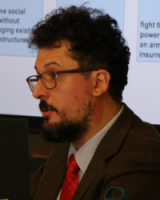
dr Fabio Coriolano
volunteer
- Bio
Doctor of economics and finance, graduate of the Gdańsk University of Technology. Since 2024 he works at the Middle East and Central Asia Unit at the Warsaw School of Economics as an assistant professor. He deals with social policy of countries in the Middle East and North Africa region and other Islamic countries. He also conducts research on the impact of globalization on the economies and societies of this region.
- Publications in English
- Coriolano, F. (2019). Healthcare in selected Islamic countries: a study on the composition of health care expenditure. Problemy Polityki Społecznej. Studia i Dyskusje, (46 (3)), 61-77.0000-0001-9341-5114.
- Contact
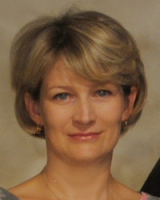
dr Monika Krukowska
assistant professor
- Bio
She earnerd her PhD in economics and works at the SGH Warsaw School of Economics as an assistant professor. Her research focuses on economic, political and security inetrests of China’s economic, political and security interests with a particular reference to its African dimension.
- Publications in English
Monographs
Krukowska M., Kłaczyński R., Kostecka-Tomaszewska L., The Belt and Road Initiative: China’s Geoeconomic Expansion Instrument, Texter, Warszawa 2018.
Articles/chapters
2023
- L. Kostecka-Tomaszewska i M. Krukowska, The UK-China Economic and Political Cooperation: The Brexit Implications, „International Entrepreneurship Review”, 2023, t.9, nr 3, s. 7–19. https://doi.org/10.15678/IER.2023.0903.01 (100 pkt) https://ier.uek.krakow.pl/pm/article/view/2108/2229
2022
- Gębska M.H., Krukowska M., COVID-19 Implications for China’s National Security, Security and Defense Quaterly, vol. 37(1), 2022.
2021
- Krukowska M., Kostecka-Tomaszewska L., China’s Economic Statecraft: The Role of the Belt and Road Initiative, European Research Studies Journal, vol. XXIV, Issue 2, DOI: 10.35808/ersj/2170, p.1019-1036, 2021, ISSN: 1108-2976,
2020
- Krukowska M., Following the EU footsteps: environmental sustainability in South Africa [w:] Connecting the European Union of shared aims, freedoms, values and responsibilities. European Union and its law, policy, and economy: internal and external dimensions, (red.) Aleksandra Borowicz, Małgorzata Dziembała, Anna Masłoń-Oracz, Ewa Latoszek, Wydawnictwo CeDeWu, Warszawa 2020, ss.143-151.
- Krukowska M., Kostecka-Tomaszewska L., Europe between China and the United States: Geoeconomic Implications of the Belt and Road Initiative, European Research Studies Journal, ISSN: 1108-2976, XXIII (1), DOI: 10.35808/ersj/1549, p.271-291. https://www.ersj.eu/journal/1549
2019
- Krukowska M., Górak-Sosnowska K., Islamic Organisations in Europe and the Refugee Crisis of 2015+ [w:] Muslim Minorities and the Refugee Crisis In Europe (red.) Katarzyna Górak-Sosnowska, Marta Pachocka, Jan Misiuna, SGH Publishing House, Warsaw 2019, ISBN , p.69-83.
- Krukowska M., South Africa: Economic and Social Aspects of Sustainable Development, Warsaw Forum of Economic Sociology 10:1(19) Spring 2019, ss.105-131.
2018
- Krukowska M., Kłaczyński R., Kostecka-Tomaszewska L., The Belt and Road Initiative: China’s Geoeconomic Expansion Instrument, Texter, Warszawa 2018
- Krukowska M., China’s economic expansion in Africa – selected aspects [w:] “International Business and Global Economy 2018”, no. 37, DOI: 10.4467/23539496IB.18.006.9379, pp. 84-97
2017
- Krukowska M., China Versus Two Koreas: Aspects of Bilateral Relations, [w:] The Korean Peninsula. Unification Trajectories: Insights from Poland and Germany, (red.) Krzysztof Kozłowski, Klaus Stüwe, SGH Publishing House, Warsaw 2017, pp. 111-133.
2016
- Krukowska M., China’s „one belt, one road” strategy and its implications for the global world order [w:] International Business and Global Economy 2016, no. 35/1, DOI: 10.4467/23539496IB.16.012.5593, pp. 157-168.
- Krukowska M., China and Africa. Cooperation Outlook after the 6th FOCAC Summit in Johannesburg, South Africa [w:] Journal of Modern Science, Wyższa Szkoła Gospodarki Euroregionalnej w Józefowie, 3/30/2016, 2016, DOI 10.13166/JoMS.issn.1734-2031, ss.157-180.
2015
- Krukowska M., The European Union and Emerging Markets. China’s New Silk Road Strategy – Challenges and Opportunities for the EU [w:] Facing the Challenges in the European Union. Re-thinking EU Education and Research for Smart and Inclusive Growth (EuInteg), (red.) Ewa Latoszek, Magdalena Proczek, Agnieszka Kłos, Marta Pachocka, Ewa Osuch-Rak, PECSA, Warszawa 2015, ss. 181-191
- Krukowska M., Chinese Soft Power – Implications and Limits [w:] Journal of Modern Science, Wyższa Szkoła Gospodarki Euroregionalnej w Józefowie, 3/26/2015, 2015, DOI 10.13166/JoMS.issn.1734-2031, ss.193-210
- Krukowska M., China: A Global Rising Power?, [w:] Opportunities for cooperation between Europe and Asia, (red.) Magdalena Sitek, Michał Łęski, Wyższa Szkoła Gospodarki Euroregionalnej, Józefów 2015, ss. 27-48
2014
- Krukowska M., China’s Soft Power in Bilateral Relations with the European Union [w:] Socio-economic relations between Europe and Asia in the 21st century, (red.) Magdalena Sitek, Michał Łęski, Wyższa Szkoła Gospodarki Euroregionalnej, Józefów 2014, ss.29-46
- Krukowska M., China and African Energy Resources [w:] Journal of Modern Science, Wyższa Szkoła Gospodarki Euroregionalnej w Józefowie, 1/20/2014, styczeń 2014, DOI 10.13166/JoMS.issn.1734-2031, ss.287-312
- Krukowska M., China in Africa: the Power of Soft Power [w:] Marszałek-Kawa J. (red.) Economy and growth from the Asian states’ perspective. Biblioteka Azji i Pacyfiku, Wydawnictwo Adam Marszałek, Toruń 2014, s.180-205.
2013
- Krukowska M., European investors and land acquisitions in Sub-Saharan Africa [w:] Problems of World Agriculture, Scientific Journal, Warsaw University of Life Sciences - SGGW, 2013, vol. 13 (XXVIII), nb 4, pp. 94-104
- Contact
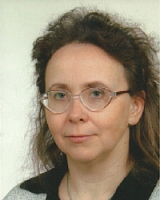
dr hab. Joanna Modrzejewska-Leśniewska, prof. SGH
associate professor
- Bio
She graduated from the Historical Institute at University of Warsaw. She works at the SGH Warsaw School of Economics as an associate professor. Her research focuses on the past and present of international relations wit a focus on the states of Central Asia, reaching from India to Iran and Pakistan. Author of such books as Talibowie [Taliban] (2001) and Afganistan w XX wieku [Afghanistan in 20th century] (2010).
- Publications in English
- Economy and Society of Afghanistan – a Special Case of the ‘Dutch Disease’ “Warsaw Forum of Economic Sociology” 3:2(6) Autumn 2012, s. 69-91
- On a Way to Establishing the United States – Afghan Diplomatic Relations, 1919-1942, w: Polish Perspectives on American History Insights, Interpretations, Revisions (ed.) Halina Parafianowicz, Wydawnictwo Uniwersytetu w Białymstoku, Białystok 2013, s. 131-148
- The Soviet Intervention in Afghanistan as a Continuation of Imperial Policy of Tsarist Russia, w: Empires and Nations from the Eighteenth to the Twentieth Century, vol. 2, (red.) Antonello Biagini, Giovanna Motta, Cambridge Scholar Publishing, Newcastle upon Tyne 2014, s. 110-119
- President of the state in the Afghan Constitution, „Studia z polityki publicznej”, 1(5) 2015, 1(5)2015, s. 137-157.
- Contact
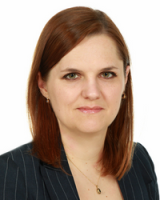
dr Agnieszka Syliwoniuk-Wapowska
assistant professor
- Bio
She graduated from the Faculty of Journalism and Political Science (MA and BA in political science) and Faculty of Oriental Studies (MA in cultural studies: Arabic studies) at University of Warsaw, and earned her PhD in political science at the University of Warsaw. She works as an assistant professor at the Middle East and Central Asia Unit. Her research interests focus on political and social issues of the Arab world. She conducted her research in Jordan, Morocco, Spain, France and Malta.
- Publications in English
- Syliwoniuk-Wapowska A., Women’s political activity and leadership in the Maghreb countries. A post-Arab Spring perspective, „Przegląd Politologiczny” nr 3/2024, DOI: 10.14746/pp.2024.29.3.9
- Syliwoniuk-Wapowska A., Sainthood as a Form of Capital: the Case of Maraboutism in Morocco, „Asian and African Studies”, vol. 32, no.1/2023, DOI: https://doi.org/10.31577/aassav.2023.32.1.03
- Syliwoniuk-Wapowska A., Identity and Inventions of the Past in the City Space: the Case of Dubai, „Hemispheres. Studies on Cultures and Societies” nr 32/2017.
- Syliwoniuk-Wapowska A., Cultural Security, Nation-building and the State in Jordan, „Public Security and Public Order”, vol. 17, 2016.
- Syliwoniuk A., Malta’s national holidays as a reflection of history and identity of the Maltese people, „Społeczeństwo i Polityka. Pismo edukacyjne”, nr 2 (35)/2013.
- Contact

dr Rafał Towalski
assistant professor
- Bio
He earned his PhD in Economics. He studies capitalism and industrial relations. He is the author of several dozen scientific studies. Winner of the Minister of Science and Education Award in 2021. He is an expert on the labor market of the employer organization - Business Center Club. In addition to his teaching and research activities, he is involved in teams dealing with the accessibility of the University. He is the chairman of the team of accessibility ambassadors and supports students on the autism spectrum.
- Publications in English
- Gardawski J., Rapacki R., Towalski R., Comparative Analysis of Industrial Relations in Central Eastern and Western Europe, Warsaw Forum of Economic Sociology 11; 2(20), SGH, Warszawa,2019, s. 95-144.
- Gardawski J., Towalski R., Labor Market and Industrial relations, w: Diversity of Patchwork Capitalism in Central and Eastern Europe, Rapacki R. (red.), Rutledge, London 2019, s. 84–103.
- Próchniak M., Rapacki R., Gardawski J., Czerniak A., Hrobaczewska B., Karbowski A., Maszczyk P., Towalski R., The Emerging Models of capitalism in CEE11 Countries – a Tentative Comparision with Western Europe, Warsaw Forum of Economic Sociology 7;2(14), SGH, Warszawa 2016, s. 7-70.
- Towalski R., Breve historie du corporatisme dans les pays du groupe de Viszegrad, in: Les relations professionnelles en Europe et en Amerique latine, Anne Dufresne, Nicole Maggi-Germain (ed.), Presse Universitaires de Rennes, Rennes 2014, s.123-37
- Towalski R., Social Dialogue as a supporting mechanism for restructuring processes, Warsaw Forum of Economic Sociology, Warsaw School of Economics 2; 2(4), SGH, Warszawa 2011, s. 51-66.
- Towalski R., Employee representation in Central European countries, in: Socially Unbalanced Europe. Socio-political proposals in time of crisis, (ed.) K. Busch, M. Floer, H. Khol, H. Schlatermund, The Merlin Press Ltd., Pontypool 2011, s. 66-78.
- Contact
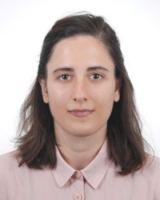
Deniz Doğanay, MA
PhD Student
- Bio
Deniz is a PhD candidate specializing in the comparative analysis of Islamic educators in Austria and Poland focusing on policies, challenges, and practices. She is deeply interested in the fields of islamic education, interfaith dialogue, and gender equality. Her research is being supervised by Katarzyna Górak-Sosnowska. She has graduated in international relations, obtaining both her bachelor’s and master’s degrees from Vistula University, Warsaw, Poland. Since October 2018, she has been contributing as an Event Coordinator to intercultural and interfaith dialogue at the Dunaj Dialog Institute in Warsaw.
- Publication
- Aslan, D. H., & Doğanay, D. (2019). Measuring gender equality. A comparative analysis of Sweden and Turkey. Kwartalnik Naukowy Uczelni Vistula, 2(60), 43-64. Akademia Finansów i Biznesu Vistula w Warszawie.
- Contact
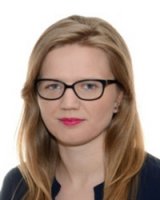
mgr Aleksandra Tołczyk
PhD student
- Bio
She graduated from the Faculty of Political Sciences and International Studies at University of Warsaw. She worked at the SGH Warsaw School of Economics as a research assistant (2022-2025). She is also a PhD Candidate in Political and Administrative Sciences (SGH, 2020-). Her research focuses on preventing radicalisation in UK and USA.
- Contact
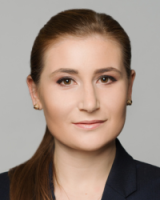
Dr Agata Górska-Lisicka
associate, engaged in CEEMEA
- Bio
holds PhD in political sciences from SGH, graduated from the Jagiellonian University in Kraków with a master’s degree in Law and a bachelor’s degree in Oriental Philology. She completed postgraduate Foreign Policy Studies at Collegium Civitas in cooperation with the Polish Institute of Foreign Affairs. After a legal apprenticeship and a bar examination in Warsaw, she became an advocate. Her research interests include: deradicalisation programmes in the Middle East and North Africa countries, countering violent extremism, and deradicalisation policies.
- Publications in English
- A. Górska, „To what extent has the EU become a security actor and how does the EU’s role in this area compare with that of NATO?“, w: “Bezpieczeństwo współczesnego świata: historia, wyzwania, konflikty zbrojne”, pod red. Janusza Krawata, Poznań 2014, Wyd. WSHiU, ISBN: 978-83-61449-41-6, s. 75-86;
- Contact
Promoted Doctors:
Dr Radosław Sadowski (2024)
Dissertation topic: Frenemies - anlaysis of collaboration and competition of Turkey and Iran through the lens of international roles
Supervisor: Dr. hab. Katarzyna Górak-Sosnowska, prof. SGH, co-supervisor: Dr Barbara Kratiuk (UW)
Dr. Agata Górska-Lisicka (2024)
Dissertation topic: Deradicalization experiences in North African and Middle Eastern countries
Supervisor: Dr. hab. Katarzyna Górak-Sosnowska, prof. SGH, co-supervisor: Dr. Agnieszka Syliwoniuk-Wapowska